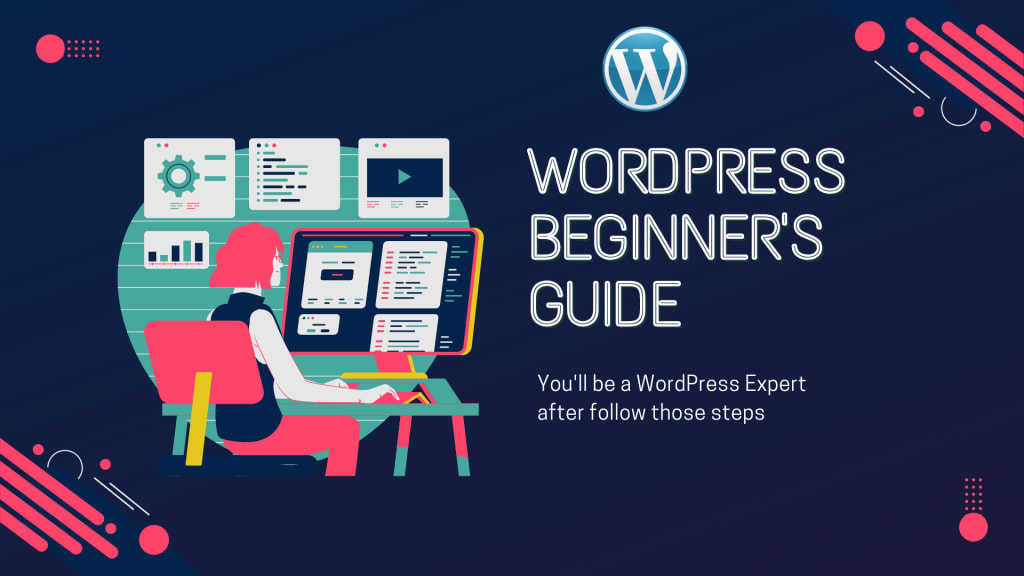How to Become a WordPress Expert: A Beginner's Guide
Are you new to WordPress and looking to become an expert? If so, you’ve come to the right place! This beginner’s guide will show you how

How to Use WordPress as a Beginner: A Comprehensive Guide
WordPress is a popular and versatile content management system (CMS) that powers millions of websites across the internet. If you’re a beginner looking to learn WordPress, you’ve made a great choice. It’s user-friendly and customizable, and offers numerous resources to help you get started. In this guide, we’ll walk you through the essential steps to harness the power of WordPress and build your website.
Choose a Hosting Provider and Install WordPress:
To get started, you’ll need a hosting provider that supports WordPress. Many reputable options, such as Bluehost, SiteGround, and WP Engine, are available. After selecting a provider, sign up for an account and follow their instructions to install WordPress. Most hosting providers offer one-click installations, making the process quick and straightforward.
Familiarize Yourself with the WordPress Dashboard:
Once WordPress is installed, you can access your website’s admin area through the WordPress dashboard. You’ll manage your site’s content, appearance, and functionality here. Spend some time exploring the different sections of the dashboard, including posts, pages, plugins, and themes. Familiarize yourself with the layout and options available to you.
Create Your Website’s Content:
WordPress allows you to create two primary types of content: posts and pages. Commands are typically used for time-sensitive content like blog articles, news updates, or events. Runners, however, are more suited for static content, like an About page, Contact page, or Services carrier. Start by creating a few essential pages, and then focus on publishing engaging posts to attract and engage your audience.
Customize Your Website’s Appearance:
One of the significant advantages of WordPress is its extensive theme library. Themes control the overall look and layout of your website. You can choose from thousands of free and premium articles to find one that matches your vision. Navigate to the “Appearance” section in the dashboard and explore the available options. Customize your chosen theme by modifying colors, fonts, and layouts to create a unique and visually appealing website.
Enhance Functionality with Plugins:
Plugins are like apps for your WordPress website, extending its functionality beyond the core features. They allow you to add features such as contact forms, search engine optimization (SEO) tools, security measures, and social media integration. WordPress has a vast plugin directory with thousands of options. Install plugins that align with your website’s goals and ensure they come from reputable sources.
Optimize Your Website for Search Engines:
Search engine optimization is essential for improving your website’s visibility in search engine results. Install an SEO plugin like Yoast SEO or All in One SEO Pack to help you optimize your content. These plugins guide optimizing your pages and posts for keywords, improving meta tags, generating XML sitemaps, and more. Learning SEO best practices will help attract organic traffic to your website.
Regularly Update WordPress, Themes, and Plugins:
WordPress frequently releases updates to improve security, fix bugs, and add new features. It’s crucial to keep your WordPress core, themes, and plugins up to date to maintain site security and performance. Regularly check for updates in the dashboard and apply them as they become available. This simple practice will help ensure your website stays secure and runs smoothly.
Join the WordPress Community:
WordPress has a large and supportive community of users, developers, and experts. Engage with the community by joining forums, attending meetups, and participating in online discussions. You can find solutions to common problems, gain inspiration, and learn from experienced WordPress users. Many WordPress tutorials, blogs, and YouTube channels offer valuable resources for learning and mastering the platform. Remember, learning WordPress is an ongoing process. As you gain experience and become comfortable with the basics, you can delve deeper into advanced features and functionalities. Here are a few additional tips to further enhance your WordPress skills:
Backup Your Website Regularly:
Creating regular WordPress website backups is crucial to safeguard against data loss. Backup plugins like UpdraftPlus or BackupBuddy can automate this process for you. Set a schedule to back up your website’s files and database to an external storage location or cloud service. In case of unforeseen issues, you can quickly restore your website to its previous working state.
Explore Advanced Customization Options:
WordPress offers advanced customization options to make your website truly unique. You can edit your theme’s code directly or create a child theme to preserve customizations during theme updates. Additionally, you can use custom CSS to modify the appearance of your site without altering the theme’s files. Learning the basics of HTML, CSS, and PHP can give you greater control over your website’s design and functionality.
Improve Website Performance:
Optimizing your website’s performance is crucial for user experience and search engine rankings. Use caching plugins like WP Rocket or W3 Total Cache to speed up page loading times. Compress and optimize images before uploading them to your website. Minify CSS and JavaScript files to reduce file sizes. Consider using a content delivery network (CDN) to deliver your website’s content faster to visitors worldwide.
Secure Your Website:
Website security is essential to protect your data and visitors’ information. Install a security plugin like Wordfence or Sucuri to add an extra layer of protection. Regularly update your passwords and use strong, unique combinations. Enable two-factor authentication to secure your WordPress admin area further. Be cautious when installing themes and plugins; only download them from trusted sources.
Monitor and Analyze Your Website’s Performance:
Keep track of your website’s performance and visitor behavior using tools like Google Analytics. Analyze metrics such as page views, bounce rate, and conversions to gain insights into your audience and make data-driven decisions. Monitoring your website’s performance will help you identify areas for improvement and optimize your content and marketing strategies.
Keep Learning and Stay Updated:
WordPress is continuously evolving, and new features and updates are regularly released. Stay updated with the latest news, trends, and best practices by following WordPress-related blogs, attending webinars, and exploring official WordPress resources. Learning and adapting will enable you to maximize WordPress’s capabilities and stay ahead in the ever-changing digital landscape.
In conclusion, WordPress is an excellent platform for beginners to build websites quickly. By following these steps and investing time in learning and experimenting, you can unlock the full potential of WordPress. Remember to start small, be patient, and continuously improve your skills. With dedication and practice, you’ll become proficient in using WordPress and create impressive websites that meet your goals and captivate your audience.





Comments
There are no comments for this story
Be the first to respond and start the conversation.